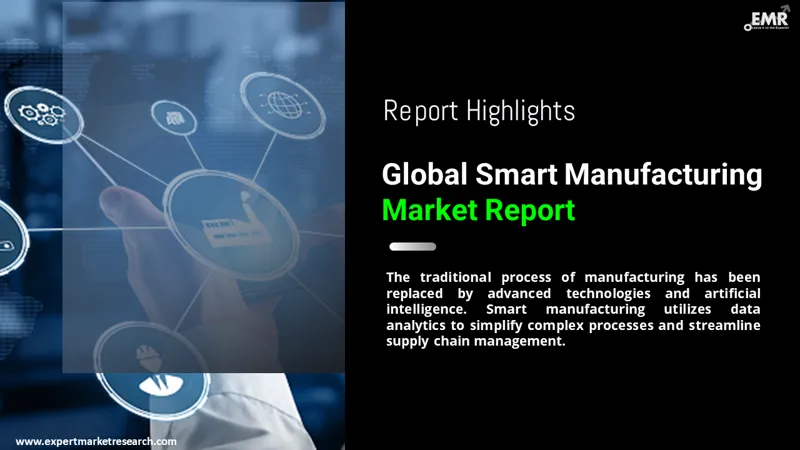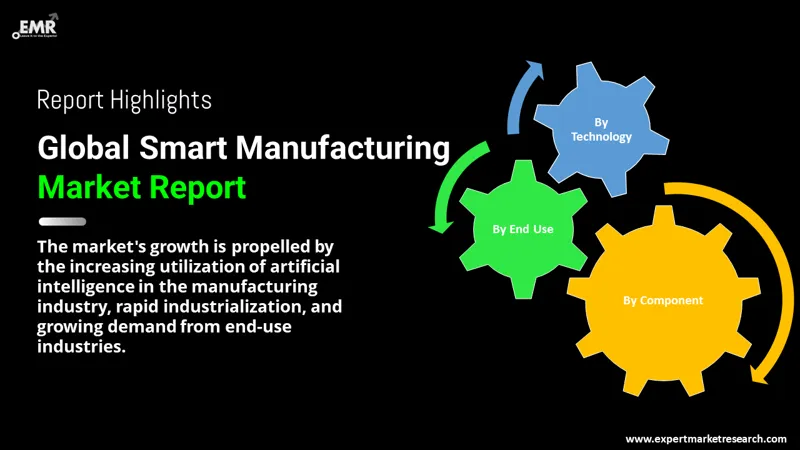
Consumer Insights
Uncover trends and behaviors shaping consumer choices today
Procurement Insights
Optimize your sourcing strategy with key market data
Industry Stats
Stay ahead with the latest trends and market analysis.
The global smart manufacturing market attained a value of nearly USD 332.01 Billion in 2025. The market is further expected to grow in the forecast period of 2026-2035 at a CAGR of 12.00% to attain nearly USD 1031.17 Billion by 2035.
Base Year
Historical Period
Forecast Period
Compound Annual Growth Rate
12%
Value in USD Billion
2026-2035
*this image is indicative*
| Global Smart Manufacturing Market Report Summary | Description | Value |
| Base Year | USD Billion | 2025 |
| Historical Period | USD Billion | 2019-2025 |
| Forecast Period | USD Billion | 2026-2035 |
| Market Size 2025 | USD Billion | 332.01 |
| Market Size 2035 | USD Billion | 1031.17 |
| CAGR 2019-2025 | Percentage | XX% |
| CAGR 2026-2035 | Percentage | 12.00% |
| CAGR 2026-2035 - Market by Region | Asia Pacific | 13.8% |
| CAGR 2026-2035 - Market by Country | India | 15.9% |
| CAGR 2026-2035 - Market by Country | China | 13.2% |
| CAGR 2026-2035 - Market by Component | Software | 13.4% |
| CAGR 2026-2035 - Market by Technology | Product Lifecycle Management | 13.7% |
| Market Share by Country 2025 | France | 3.1% |
Advanced technologies and artificial intelligence have replaced the traditional process of manufacturing. Smart manufacturing uses data analytics to ease complicated and difficult processes and also manages the supply chain smoothly. The rising demand for simplified processes in various industries is aiding the market growth of smart manufacturing. Smart machines or robots gather and understand large data that keeps them well informed throughout the manufacturing process. Data is collected, refined and made for the purpose of computing at ease by the robots. With the help of the stored data, the robots can improve machine performance and predict any fault in the manufacturing processes as they can learn from experience. They can predict, and that helps to facilitate better strategies for scheduling production runs. In smart manufacturing system, production processes can automatically generate, transmit and process data without human intervention, consequently bolstering the market growth.

Read more about this report - REQUEST FREE SAMPLE COPY IN PDF
Smart manufacturing is defined as bringing the elements of smart technology to the traditional process of production. These technologies help to create new opportunities to accelerate development, reduce waste, and increase production.
Based on component, the market is divided into:
Based on technology, the market is divided into:
Based on end use, the market is divided into:
The EMR report looks into the regional markets of smart manufacturing like:
| CAGR 2026-2035 - Market by | Country |
| India | 15.9% |
| China | 13.2% |
| USA | 10.7% |
| France | 9.4% |
| Italy | 8.4% |
| Canada | XX% |
| UK | XX% |
| Germany | XX% |
| Japan | 8.3% |
| Australia | XX% |
| Saudi Arabia | XX% |
| Brazil | XX% |
| Mexico | XX% |

Read more about this report - REQUEST FREE SAMPLE COPY IN PDF
Industrial robots or smart machines meet the needs of mass demands through their autonomous and well-communicated system. These robots are capable of completing their work in time, and they are assisted by AI that allows them to learn from experience. They are flexible as they can be reconfigured and repurposed. The robots have the ability to respond rapidly to design changes and innovation, which is a competitive advantage over the more traditional manufacturing process, consequently furthering the market growth of smart manufacturing. The fear of the spread of coronavirus has led the production process to be even more dependent on machines. Smart manufacturing assists in workers’ safety. Due to their data research and intelligent learning automation, it makes it easy for workers to operate any function smoothly. In addition to this, workers are no longer exposed to hazards. AI eliminates the inefficiencies and can let robots take on more of the physical tasks of manufacturing, which is a crucial catalyst for the market growth.
The report presents a detailed analysis of the following key players in the global smart manufacturing market, looking into their capacity, market shares, and latest developments like capacity expansions, plant turnarounds, and mergers and acquisitions:
The comprehensive report looks into the macro and micro aspects of the industry. The EMR report gives an in-depth insight into the market by providing a SWOT analysis as well as an analysis of Porter’s Five Forces model.




*While we strive to always give you current and accurate information, the numbers depicted on the website are indicative and may differ from the actual numbers in the main report. At Expert Market Research, we aim to bring you the latest insights and trends in the market. Using our analyses and forecasts, stakeholders can understand the market dynamics, navigate challenges, and capitalize on opportunities to make data-driven strategic decisions.*
Get in touch with us for a customized solution tailored to your unique requirements and save upto 35%!
In 2025, the global smart manufacturing market attained a value of nearly USD 332.01 Billion.
The market is projected to grow at a CAGR of 12.00% between 2026 and 2035.
The market is being driven by the rising use of artificial intelligence in the manufacturing market, rapid industrialisation, and the growing demand from the end use industries.
The key trends of the market include the rising demand for data processors and the rapid advancements in connectivity technologies like 5G.
The major regions in the market are North America, Europe, the Asia Pacific, Latin America, and the Middle East and Africa.
The significant components available in the market are hardware, software, and services.
The different technologies available in the market are programmable logic controller, supervisory controller and data acquisition (SCADA), enterprise resource and planning, human machine interface, product lifecycle management, manufacturing execution system, distributed control system, and 3D printing, among others.
The major end uses of smart manufacturing are automotive, aerospace and defence, chemicals and materials, healthcare, food and beverage, and oil and gas, among others.
The key players in the global smart manufacturing market are ABB Ltd., Emerson Electric Co., Rockwell Automation, Inc., Mitsubishi Electric Corporation, FANUC America Corporation, and Schneider Electric SE, among others.
The market is estimated to witness a healthy growth in the forecast period 2026-2035 to reach nearly nearly USD 1031.17 Billion by 2035.
Explore our key highlights of the report and gain a concise overview of key findings, trends, and actionable insights that will empower your strategic decisions.
| REPORT FEATURES | DETAILS |
| Base Year | 2025 |
| Historical Period | 2019-2025 |
| Forecast Period | 2026-2035 |
| Scope of the Report |
Historical and Forecast Trends, Industry Drivers and Constraints, Historical and Forecast Market Analysis by Segment:
|
| Breakup by Component |
|
| Breakup by Technology |
|
| Breakup by End Use |
|
| Breakup by Region |
|
| Market Dynamics |
|
| Competitive Landscape |
|
| Companies Covered |
|
| Report Price and Purchase Option | Explore our purchase options that are best suited to your resources and industry needs. |
| Delivery Format | Delivered as an attached PDF and Excel through email, with an option of receiving an editable PPT, according to the purchase option. |
Datasheet
One User
USD 2,499
USD 2,249
tax inclusive*
Single User License
One User
USD 3,999
USD 3,599
tax inclusive*
Five User License
Five User
USD 4,999
USD 4,249
tax inclusive*
Corporate License
Unlimited Users
USD 5,999
USD 5,099
tax inclusive*
*Please note that the prices mentioned below are starting prices for each bundle type. Kindly contact our team for further details.*
Flash Bundle
Small Business Bundle
Growth Bundle
Enterprise Bundle
*Please note that the prices mentioned below are starting prices for each bundle type. Kindly contact our team for further details.*
Flash Bundle
Number of Reports: 3
20%
tax inclusive*
Small Business Bundle
Number of Reports: 5
25%
tax inclusive*
Growth Bundle
Number of Reports: 8
30%
tax inclusive*
Enterprise Bundle
Number of Reports: 10
35%
tax inclusive*
How To Order

Select License Type
Choose the right license for your needs and access rights.

Click on ‘Buy Now’
Add the report to your cart with one click and proceed to register.

Select Mode of Payment
Choose a payment option for a secure checkout. You will be redirected accordingly.
Strategic Solutions for Informed Decision-Making
Gain insights to stay ahead and seize opportunities.

Get insights & trends for a competitive edge.

Track prices with detailed trend reports.

Analyse trade data for supply chain insights.

Leverage cost reports for smart savings

Enhance supply chain with partnerships.

Connect For More Information
Our expert team of analysts will offer full support and resolve any queries regarding the report, before and after the purchase.
Our expert team of analysts will offer full support and resolve any queries regarding the report, before and after the purchase.
We employ meticulous research methods, blending advanced analytics and expert insights to deliver accurate, actionable industry intelligence, staying ahead of competitors.
Our skilled analysts offer unparalleled competitive advantage with detailed insights on current and emerging markets, ensuring your strategic edge.
We offer an in-depth yet simplified presentation of industry insights and analysis to meet your specific requirements effectively.
Share